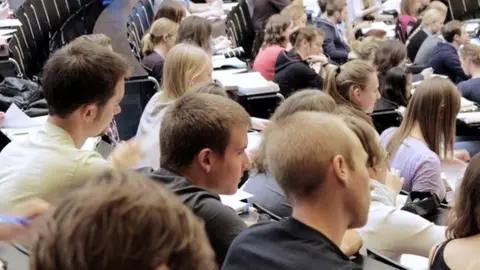MPs to probe universities' unconditional offers
 Thinkstock
ThinkstockMPs are to review whether students applying to universities are being offered unconditional places in order to secure their fees.
The number of unconditional offers made by universities rose more than 17-fold in five years.
Unconditional offers mean students do not have to worry about the grades they get in their A-levels.
Robert Halfon, Conservative chair of the Education Select Committee, said he was "very concerned" about the issue.
"It's one of the reasons why our committee is doing a value-for-money inquiry into universities and higher education.
"I think part of it is unfortunately just to do with resources and funding.
"I think that the universities want the courses filled; they get the public subsidy from the loan. I think that's why they are making these unconditional offers and why they've increased so greatly," he added.
According to figures from the Universities and Colleges Admissions Service (UCAS), in 2013, 2,985 unconditional offers were made to 18-year-old applicants in England, Wales and Northern Ireland.
By 2017, that figure had risen to 51,615.
Critics say unconditional offers are bad for students because some neglect their revision, while some accept offers that are not really right for them and later drop out.
Nick Hillman, the director of the Higher Education Policy Institute, said there was "a little bit of evidence that students who get unconditional offers are taking their foot off the pedal".
Clare Marchant, the chief executive of UCAS, said: "It's one to keep an eye on, because if it increases more, we need to think about what impact that has over a couple of years in terms of predicted A-level grades and actual A-level grades."
Some universities offer students an unconditional place, but only if they chose that institution as their "firm" choice on their UCAS form.
BBC Radio 4's You and Yours programme spoke to one sixth-form head who said: "This is a form of bribery. This is a university, for whatever reason, saying to a teenager, 'Choose us as your first offer and we will accept you on to our course, including the £27,000 worth of tuition fees that your place brings with you, and you don't necessarily need to sit the exams in the summer.'"
 SPL
SPLThe government said it was closely monitoring the number of unconditional offers made each year and what, if any, impact they might have on student outcomes.
The Education select committee is looking into unconditional offers of university places as part of a wider inquiry into whether taking a degree is good value for money.
In response, Universities UK, which represents the sector, said: "Unconditional offers account for a very small proportion of all offers made by universities.
"It is simply not in the interests of universities to take students without the potential to succeed at university," it added.
